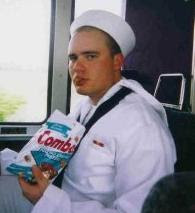Bush insider: We knew Iraq was screwed in 2005. Sorry.

I like Peter Feaver. He's a Navy man and political scientist who, along with Duke University colleague Christopher Gelpi, has undertaken the ivory tower's only serious study of civil-military affairs since the early '60s. (Full disclosure: I had collegial discussions with both men in 2005 and considered attending Duke to study with them. I went to journalism school instead.)
Dr. Feaver has another claim to fame: while serving on George W. Bush's National Security Council from 2005-2007, Feaver was outed as the Man Behind the Curtain, the architect of an Iraq "Plan for Victory" that Bush unveiled in a November '05 speech to the midshipmen of Annapolis (shown above; a captive audience, if there ever was one). Feaver's job was, as we former members of the Naval Academy's brigade sometimes say, to "polish the turd" that was Iraq, to put a happy face on a debacle that was quickly losing support.
So what's the problem? According to a new mea culpa by Feaver in Commentary, there never was a plan for victory - just a plan to forestall disaster until the next poor presidential mensch took over. Here's what he says now:
By the middle of 2005, it was painfully obvious to everyone involved that the only decisive outcome that could be achieved during President Bush’s tenure was the triumph of our enemies, America’s withdrawal, and Iraq’s descent into a hellish chaos as yet undreamed of. The challenge, therefore, was to develop and implement a workable strategy that could be handed over to Bush’s successor. Although important progress could be made on that strategy during Bush’s watch, ultimately it would be carried through by the next President.
Call me naive, but isn't this just a little devastating to hear from an administration official? To be fair, Feaver and his colleagues still saw "victory" as a possibility... but only in abstraction, on someone else's watch. Doesn't seem to square with some of the words he put in the president's mouth that evening by the Bay in Annapolis. He didn't tell the sea of future military officers they'd be marking time in the sand for the next three years. He didn't say victory was the next guy's concern. Instead, he said:
Against this adversary, there is only one effective response: We will never back down. We will never give in. And we will never accept anything less than complete victory. ...
... in the past year, Iraqi forces have made real progress. At this time last year, there were only a handful of Iraqi battalions ready for combat. Now, there are over 120 Iraqi Army and Police combat battalions in the fight against the terrorists... and they're helping to turn the tide of this struggle in freedom's favor. ...
As Iraqi forces increasingly take the lead in the fight against the terrorists, they're also taking control of more and more Iraqi territory. ...
We're also transferring forward operating bases to Iraqi control... From many of these bases, the Iraqi security forces are planning and executing operations against the terrorists -- and bringing security and pride to the Iraqi people. ...
The facts are that Iraqi units are growing more independent and more capable; they are defending their new democracy with courage and determination. They're in the fight today, and they will be in the fight for freedom tomorrow. (Applause.) ...
As the Iraqi security forces stand up, their confidence is growing and they are taking on tougher and more important missions on their own. As the Iraqi security forces stand up, the confidence of the Iraqi people is growing -- and Iraqis are providing the vital intelligence needed to track down the terrorists. And as the Iraqi security forces stand up, coalition forces can stand down -- and when our mission of defeating the terrorists in Iraq is complete, our troops will return home to a proud nation. (Applause.) ...
Some critics continue to assert that we have no plan in Iraq except to, "stay the course." If by "stay the course," they mean we will not allow the terrorists to break our will, they are right... Our strategy in Iraq is clear, our tactics are flexible and dynamic; we have changed them as conditions required and they are bringing us victory against a brutal enemy. (Applause.)
Sounds to me like LBJ, McNamara, Nixon and Kissinger redux: Pee on America's collective leg and tell the citizenry it's raining. Feaver and Gelpi's great contribution in civil-military affairs was the idea that the U.S. public isn't casualty-averse: Americans are willing to tolerate bloody wars as long as they see a worthy goal within sight. But in Feaver's experience, this notion compelled him to help manufacture hope in Middle America - "Have the president tell them we're turning a corner; it'll buy us some time."
We're still stuck in Iraq, and failure is still an option. Middle America rightly smelled trouble in 2005; some foreign-policy realists and counterinsurgency theorists smelled it much earlier. What Feaver should have learned is that you can't manufacture hope in the absence of evidence. If any chance for success and stability is to be had in Iraq - and I cling to the hope that it is - we should at least have a commander in chief who is sufficiently sanguine - and honest - about our prospects.


0 Comments:
Post a Comment
Subscribe to Post Comments [Atom]
<< Home